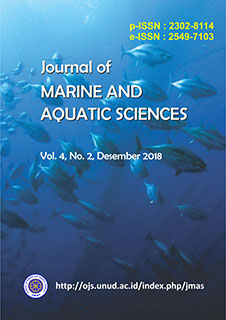Keterkaitan Komunitas Makrozoobentos dengan Kualitas Air dan Substrat di Ekosistem Mangrove Taman Hutan Raya Ngurah Rai Bali
Abstract
Ngurah Rai forest park located in two districts of Badung and Denpasar city which is as the main centre of anthropogenic activities. There is an estuary in this area that used as run off of those activities. This area faces directly into the ocean. Wastes from anthropogenic activities indirectly affected biotic and abiotic components such as water quality, substrate, and macrozoobenthos. This research aims to discover the community of macrozoobenthos and its relation to the water quality and substrate in Ngurah Rai forest park. This research used purposive sampling metode to determine of stations. Sampling was conducted at four different stations covering macrozoobenthos samples, measuring water quality (salinity, pH, DO, temperature, turbidity) and substrate samples. A total of 19 types of macrozoobenthos was found out of 5 classes, i.e. Polychaeta, Oligochaeta, Bivalves, Gastropods, and Crustaceans. The diversity index was categorized as low to moderate. The uniformity index value of community was categorized as balanced. The dominant index on the fourth station states that the level of dominance was categorized as low. Water quality parameter measurement results were still within normal limits, but the turbidity value of the first station exceeds the normal limits due to high content of organic matter. The substrate type at first station to fourth station were sandy clay loam, sandy loam, clay loam, and sandy loam respectively. Temperature, salinity, turbidity were the parameters that greatly affected the abundance of macrozoobenthos, while substrates such as sand and clay have a major influence on the abundance of macrozoobenthos.
Downloads

This work is licensed under a Creative Commons Attribution 3.0 International License.
Copyright 2012 - 2023 Journal of Marine and Aquatic Sciences (JMAS)
Published by Fakultas Kelautan dan Perikanan Universitas Udayana, Denpasar, Bali, Indonesia
JMAS (p-ISSN 2302-8114; e-ISSN 2549-7103)


